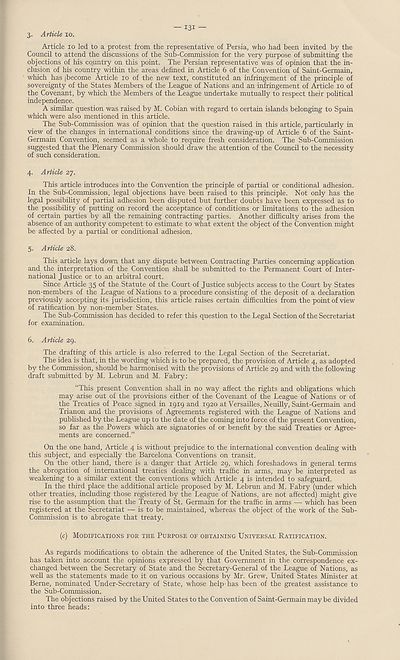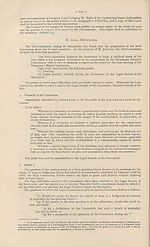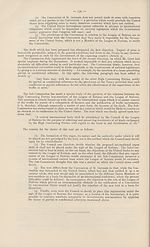Armament > Conference for the control of the international trade in arms, munitions and implements of war
(133)
Download files
Complete book:
Individual page:
Thumbnail gallery: Grid view | List view

— I3I
3. Article 10.
Article 10 led to a protest from the representative of Persia, who had been invited by the
Council to attend the discussions of the Sub-Commission for the very purpose of submitting the
objections of his country on this point. The Persian representative was of opinion that the in¬
clusion of his country within the areas defined in Article 6 of the Convention of Saint-Germain,
which has jbecome Article 10 of the new text, constituted an infringement of the principle of
sovereignty of the States Members of the League of Nations and an infringement of Article 10 of
the Covenant, by which the Members of the League undertake mutually to respect their political
independence.
A similar question was raised by M. Cobian with regard to certain islands belonging to Spain
which were also mentioned in this article.
The Sub-Commission was of opinion that the question raised in this article, particularly in
view of the changes in international conditions since the drawing-up of Article 6 of the Saint-
Germain Convention, seemed as a whole to require fresh consideration. The Sub-Commission
suggested that the Plenary Commission should draw the attention of the Council to the necessity
of such consideration.
4. Article 27.
This article introduces into the Convention the principle of partial or conditional adhesion.
In the Sub-Commission, legal objections have been raised to this principle. Not only has the
legal possibility of partial adhesion been disputed but further doubts have been expressed as to
the possibility of putting on record the acceptance of conditions or limitations to the adhesion
of certain parties by all the remaining contracting parties. Another difficulty arises from the
absence of an authority competent to estimate to what extent the object of the Convention might
be affected by a partial or conditional adhesion.
5. Article 28.
This article lays down that any dispute between Contracting Parties concerning application
and the interpretation of the Convention shall be submitted to the Permanent Court of Inter¬
national Justice or to an arbitral court.
Since Article 35 of the Statute of the Court of Justice subjects access to the Court by States
non-members of the League of Nations to a procedure consisting of the deposit of a declaration
previously accepting its jurisdiction, this article raises certain difficulties from the point of view
of ratification by non-member States.
The Sub-Commission has decided to refer this question to the Legal Section of the Secretariat
for examination.
6. Article 29.
The drafting of this article is also referred to the Legal Section of the Secretariat.
The idea is that, in the wording which is to be prepared, the provision of Article 4, as adopted
by the Commission, should be harmonised with the provisions of Article 29 and with the following
draft submitted by M. Lebrun and M. Fabry:
“This present Convention shall in no way affect the rights and obligations which
may arise out of the provisions either of the Covenant of the League of Nations or of
the Treaties of Peace signed in 1919 and 1920 at Versailles, Neuilly, Saint-Germain and
Trianon and the provisions of Agreements registered with the League of Nations and
published by the League up to the date of the coming into force of the present Convention,
so far as the Powers which are signatories of or benefit by the said Treaties or Agree¬
ments are concerned.”
On the one hand, Article 4 is without prejudice to the international convention dealing with
this subject, and especially the Barcelona Conventions on transit.
On the other hand, there is a danger that Article 29, which foreshadows in general terms
the abrogation of international treaties dealing with traffic in arms, may be interpreted as
weakening to a similar extent the conventions which Article 4 is intended to safeguard.
In the third place the additional article proposed by M. Lebrun and M. Fabry (under which
other treaties, including those registered by the League of Nations, are not affected) might give
rise to the assumption that the Treaty of St. Germain for the traffic in arms — which has been
registered at the Secretariat — is to be maintained, whereas the object of the work of the Sub-
Commission is to abrogate that treaty.
(c) Modifications for the Purpose of obtaining Universal Ratification.
As regards modifications to obtain the adherence of the United States, the Sub-Commission
has taken into account the opinions expressed by that Government in the correspondence ex¬
changed between the Secretary of State and the Secretary-General of the League of Nations, as
well as the statements made to it on various occasions by Mr. Grew, United States Minister at
Berne, nominated Under-Secretary of State, whose help-has been of the greatest assistance to
the Sub-Commission.
The objections raised by the United States to the Convention of Saint-Germain maybe divided
into three heads:
3. Article 10.
Article 10 led to a protest from the representative of Persia, who had been invited by the
Council to attend the discussions of the Sub-Commission for the very purpose of submitting the
objections of his country on this point. The Persian representative was of opinion that the in¬
clusion of his country within the areas defined in Article 6 of the Convention of Saint-Germain,
which has jbecome Article 10 of the new text, constituted an infringement of the principle of
sovereignty of the States Members of the League of Nations and an infringement of Article 10 of
the Covenant, by which the Members of the League undertake mutually to respect their political
independence.
A similar question was raised by M. Cobian with regard to certain islands belonging to Spain
which were also mentioned in this article.
The Sub-Commission was of opinion that the question raised in this article, particularly in
view of the changes in international conditions since the drawing-up of Article 6 of the Saint-
Germain Convention, seemed as a whole to require fresh consideration. The Sub-Commission
suggested that the Plenary Commission should draw the attention of the Council to the necessity
of such consideration.
4. Article 27.
This article introduces into the Convention the principle of partial or conditional adhesion.
In the Sub-Commission, legal objections have been raised to this principle. Not only has the
legal possibility of partial adhesion been disputed but further doubts have been expressed as to
the possibility of putting on record the acceptance of conditions or limitations to the adhesion
of certain parties by all the remaining contracting parties. Another difficulty arises from the
absence of an authority competent to estimate to what extent the object of the Convention might
be affected by a partial or conditional adhesion.
5. Article 28.
This article lays down that any dispute between Contracting Parties concerning application
and the interpretation of the Convention shall be submitted to the Permanent Court of Inter¬
national Justice or to an arbitral court.
Since Article 35 of the Statute of the Court of Justice subjects access to the Court by States
non-members of the League of Nations to a procedure consisting of the deposit of a declaration
previously accepting its jurisdiction, this article raises certain difficulties from the point of view
of ratification by non-member States.
The Sub-Commission has decided to refer this question to the Legal Section of the Secretariat
for examination.
6. Article 29.
The drafting of this article is also referred to the Legal Section of the Secretariat.
The idea is that, in the wording which is to be prepared, the provision of Article 4, as adopted
by the Commission, should be harmonised with the provisions of Article 29 and with the following
draft submitted by M. Lebrun and M. Fabry:
“This present Convention shall in no way affect the rights and obligations which
may arise out of the provisions either of the Covenant of the League of Nations or of
the Treaties of Peace signed in 1919 and 1920 at Versailles, Neuilly, Saint-Germain and
Trianon and the provisions of Agreements registered with the League of Nations and
published by the League up to the date of the coming into force of the present Convention,
so far as the Powers which are signatories of or benefit by the said Treaties or Agree¬
ments are concerned.”
On the one hand, Article 4 is without prejudice to the international convention dealing with
this subject, and especially the Barcelona Conventions on transit.
On the other hand, there is a danger that Article 29, which foreshadows in general terms
the abrogation of international treaties dealing with traffic in arms, may be interpreted as
weakening to a similar extent the conventions which Article 4 is intended to safeguard.
In the third place the additional article proposed by M. Lebrun and M. Fabry (under which
other treaties, including those registered by the League of Nations, are not affected) might give
rise to the assumption that the Treaty of St. Germain for the traffic in arms — which has been
registered at the Secretariat — is to be maintained, whereas the object of the work of the Sub-
Commission is to abrogate that treaty.
(c) Modifications for the Purpose of obtaining Universal Ratification.
As regards modifications to obtain the adherence of the United States, the Sub-Commission
has taken into account the opinions expressed by that Government in the correspondence ex¬
changed between the Secretary of State and the Secretary-General of the League of Nations, as
well as the statements made to it on various occasions by Mr. Grew, United States Minister at
Berne, nominated Under-Secretary of State, whose help-has been of the greatest assistance to
the Sub-Commission.
The objections raised by the United States to the Convention of Saint-Germain maybe divided
into three heads:
Set display mode to:
![]() Universal Viewer |
Universal Viewer | ![]() Mirador |
Large image | Transcription
Mirador |
Large image | Transcription
Images and transcriptions on this page, including medium image downloads, may be used under the Creative Commons Attribution 4.0 International Licence unless otherwise stated. ![]()
| League of Nations > Armament > Conference for the control of the international trade in arms, munitions and implements of war > (133) |
|---|
| Permanent URL | https://digital.nls.uk/195383492 |
|---|
| Shelfmark | LN.IX |
|---|
| Description | Over 1,200 documents from the non-political organs of the League of Nations that dealt with health, disarmament, economic and financial matters for the duration of the League (1919-1945). Also online are statistical bulletins, essential facts, and an overview of the League by the first Secretary General, Sir Eric Drummond. These items are part of the Official Publications collection at the National Library of Scotland. |
|---|---|
| Additional NLS resources: |
|

